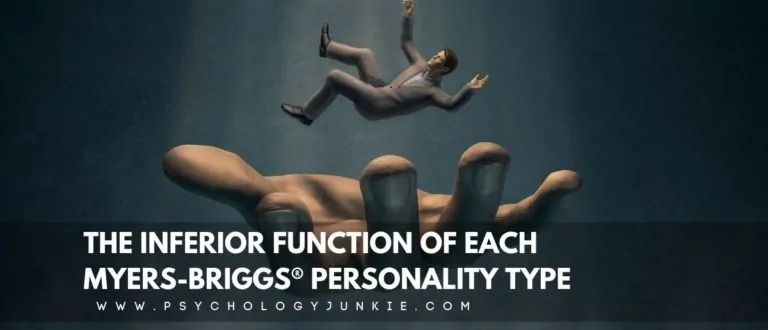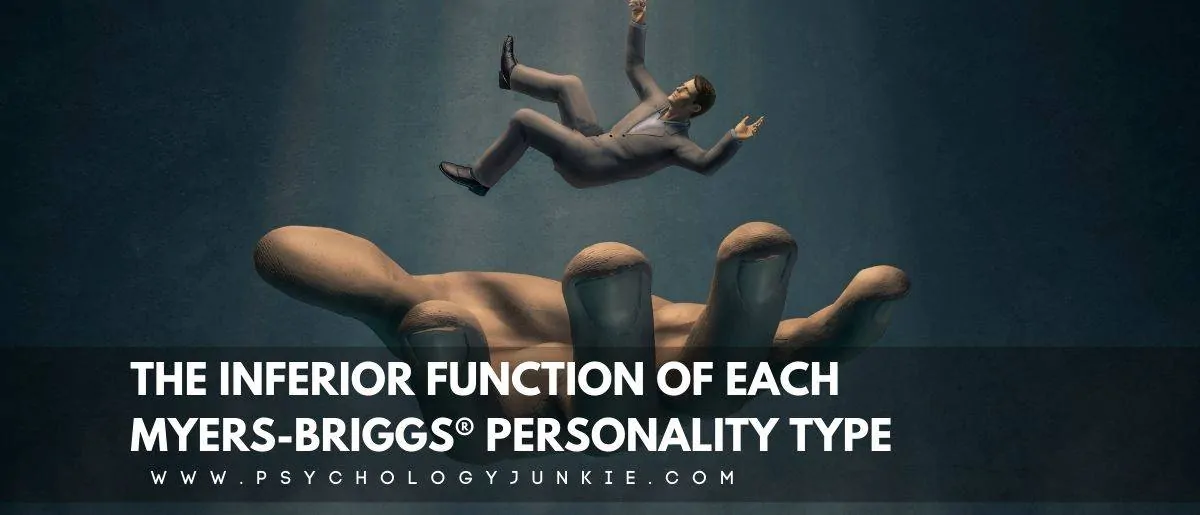Signs That You’re an Unbalanced Version of Your Myers-Briggs® Personality Type
When it comes to typology, it’s always nice to focus on our strengths rather than the weaknesses. After all, it’s a lot more impressive to share an article of ourselves that pinpoints our unique abilities than one that shows our embarrassing failures and flaws. This article will likely get shared a lot less than an article about how our personality types are sexy or incredible. But it’s essential either way. So many times we stifle certain parts of ourselves, seeing them as less “interesting” than other parts. If you’re an intuitive-dominant type, you might repress sensing so massively that you sabotage some very crucial parts of your development. So today we’re exploring how you might look if you’ve been overly-repressing your tertiary or inferior functions.
Wait, what are all these functions?

The cognitive functions are mental processes that explain how you absorb information and make decisions. Your dominant function is the “hero” of your personality and basically runs the show and is where you rely the most. Your auxiliary function is the “second-in-command” of your personality, and helps to balance your dominant function so that you’re not being too one-sided. Your tertiary function is where you go for relief, creativity, and balance as well. The inferior function tends to be your Achilles’ heel – an area of weakness, but also an area that balances your dominant function (as long as you don’t constantly ignore it).
If you want to understand the cognitive functions more fully, check out this article I wrote about them: An Introduction to the Cognitive Functions in Myers-Briggs® Theory
Keep in mind, it’s not ideal to focus 100% of your energy on your tertiary or inferior cognitive functions. Ideally, you should only work on developing these functions when you’re calm, relaxed, and life is low-pressure. And even then, you should do it in bite-sized bits of time rather than large swaths. Think of it as giving your lower functions a chance to “come up for air” so that they can be healthier and you can have a more mature/fleshed-out personality.
So without further ado, let’s get started!
Not sure what your personality type is? Take our new personality questionnaire here. Or you can take the official MBTI® here.
Unbalanced Versions of Every Myers-Briggs® Personality Type
The Unbalanced ENFP
ENFP Cognitive Function Stack:
Dominant: Extraverted Intuition (Ne)
Auxiliary: Introverted Feeling (Fi)
Tertiary: Extraverted Thinking (Te)
Inferior: Introverted Sensation (Si)
As an ENFP, it’s tempting to focus all your attention on Ne and Fi. After all, these are the functions most likely to show up in healthy, inspiring ways in your life. While this can be good, it’s important to give Te and Si a chance to breathe. When you don’t give these functions a chance to speak into your life, this is what can happen:
- You don’t take care of the details needed to actually create your inspirations. You come up with amazing ideas, but putting together the necessary resources and details to make those ideas a reality never seems to happen.
- You de-prioritize self-care and tend to forget about things like hydrating, getting enough sleep, or sticking to a healthy routine.
- You overextend yourself by saying yes to too many interesting possibilities and ignoring your physical needs or the boundaries of your actual schedule.
- You fail to back up your ideas against facts, reason, or logic.
- You become forgetful, scattered, and unrealistic.
Find some ways to balance out your personality in this article: How to Improve Your Weaknesses, Based On Your Personality Type.
The Unbalanced ENTP
ENTP Cognitive Function Stack:
Dominant: Extraverted Intuition (Ne)
Auxiliary: Introverted Thinking (Ti)
Tertiary: Extraverted Feeling (Fe)
Inferior: Introverted Sensation (Si)
As an ENTP, you recharge by focusing your energy on Ne. Ti is your “second-in-command” that guides your Ne to reasonable conclusions. While it’s ideal to focus the majority of your energy on these two functions, when you completely ignore Fe and Si you can be in for trouble. Here are some signs you’ve been overly-repressing the lower functions in your stack:
- You come up with amazing ideas, but when it comes to implementing them, you get distracted and change course.
- You chronically lose track of details that are important (like paying bills on time, getting your oil changed, or brushing your teeth).
- You fail to acknowledge or realize the impact your decisions are having on other people.
- You are so focused on challenging or debating that you damage meaningful relationships or prospective opportunities.
- You manipulate people or situations to get what you want, rather than assessing your values first.
Find out ways to balance out your personality type in this article: The Biggest Weakness of Every Myers-Briggs® Personality Type.
The Unbalanced INFP
INFP Cognitive Function Stack:
Dominant: Introverted Feeling (Fi)
Auxiliary: Extraverted Intuition (Ne)
Tertiary: Introverted Sensation (Si)
Inferior: Extraverted Thinking (Te)
As an INFP, you can’t function properly unless you’re deeply in touch with your Fi. Fi is what guides you and makes sure you’re living in alignment with your core values. Ne is what helps you to see potential, alternatives, and imaginative possibilities. While these two functions are paramount to your health and maturity, you can’t completely subdue Si and Te without risking some setbacks. Here’s what it looks like if you’ve been ignoring Si and Te for too long:
- You have incredible ideas, but when it comes to implementing them you feel lost. Rather than seek out advice or help you get stuck in inaction.
- When someone argues with you or offers criticism, instead of listening with an open mind and looking at the logic, you double-down on your stance and only focus on your internal viewpoint.
- You use logical fallacies on a regular basis and fail to see the inconsistencies in your arguments.
- You struggle to prioritize routine healthy habits like getting enough sleep, drinking enough water, or sticking to a healthy exercise routine.
Find out more about the INFP type, and get ways to overcome these challenges in my eBook, The INFP – Understanding the Dreamer.
The Unbalanced INTP
INTP Cognitive Function Stack:
Dominant: Introverted Thinking (Ti)
Auxiliary: Extraverted Intuition (Ne)
Tertiary: Introverted Sensation (Si)
Inferior: Extraverted Feeling (Fe)
Ti and Ne are your “superpower” functions, and so you tend to focus most of your energy on them. Ti helps you to analyze situations logically and see the underlying components in any idea, object, or event. Ne helps you to explore alternatives, create hypotheses, or generate possibilities. While these functions are where you want to focus first, if you completely dismiss or devalue Si and Fe you can run into setbacks in your personal life. Here’s what might be happening if you’re too “top-heavy” in your type development:
- You are insensitive to other people’s emotions and personal needs.
- You feel like everyone else is imposing on you and you fail to respect their desire for connection.
- You de-prioritize activities, perspectives, or projects because they’re not “logical” instead of seeing their value.
- You chronically forget important but mundane details like paying bills, self-care, or routine doctor’s visits.
You can find out more about unhealthy expressions of your type here: The Unhealthy INTP
The Unbalanced ENFJ
ENFJ Cognitive Function Stack:
Dominant: Extraverted Feeling (Fe)
Auxiliary: Introverted Intuition (Ni)
Tertiary: Extraverted Sensation (Se)
Inferior: Introverted Thinking (Ti)
As an ENFJ, you get into a “flow” state by dwelling on your dominant and auxiliary functions. Motivating people, inspiring them, and connecting in authentic ways gives you a sense of meaning and purpose. Tapping into the potential of others and finding significance and meaning through philosophical thought and exploration gives you lots of stimulating ideas to toy with. That said, if you completely repress Se and Ti you risk becoming out of touch with reality or having half-baked ideas. Here are some other signs that your personality type is too out of balance:
- You co-dependently prioritize other people and their needs without weighing the logical setbacks of doing so.
- You go after your ideals without analyzing the details required to make those dreams a reality.
- You struggle to relax and appreciate the moment for what it is.
- You make decisions based completely on your personal values or feelings, without analyzing the logical criteria.
Find out more about your type here: 24 Signs That You’re an ENFJ, the “Mentor” Personality Type
The Unbalanced ENTJ
ENTJ Cognitive Function Stack:
Dominant: Extraverted Thinking (Te)
Auxiliary: Introverted Intuition (Ni)
Tertiary: Extraverted Sensation (Se)
Inferior: Introverted Feeling (Fi)
As an ENTJ, you naturally prioritize Te and Ni. Te helps you to make efficient, logical decisions quickly. Ni helps you to see underlying patterns and long-term implications. Having a solid grasp of these functions can make you an inspiring leader and innovator. That said, if you completely repress or ignore input from Se and Fi, it can come back to bite you later. Here are some signs that you might be de-prioritizing them too severely:
- You dismiss or overlook other people’s feelings or their need for affirmation, connection, or emotional support.
- You decide too quickly without taking details and other people’s feelings into account.
- You struggle to relax and appreciate the moment for what it is.
- You set out to accomplish your plans and ignore specifics or nitty-gritty details that could dismantle your whole plan.
- You are condescending or dismissive towards people who value Sensing (S) or Feeling (F).
Find out more about your type here: 10 Things You’ll Relate to if You’re an ENTJ
The Unbalanced INFJ
INFJ Cognitive Function Stack:
Dominant: Introverted Intuition (Ni)
Auxiliary: Extraverted Feeling (Fe)
Tertiary: Introverted Thinking (Ti)
Inferior: Extraverted Sensation (Se)
As an INFJ, you are stimulated by the world of possibilities and visionary ideas. Because of your dominant Ni you are drawn to conceptual, symbolic, and metaphorical ideas and themes. And because you have Fe in the auxiliary position, you are usually warm, understanding, and empathetic. But what happens when you completely ignore Ti and Se? If you’re repressing these cognitive functions too severely, it can look a little like this:
- You have amazing ideas but it’s nearly impossible for you to verbalize them.
- You dedicate your life to your vision, but you fail to analyze it logically or practically. This results in ideas that never become fully realized.
- You are so single-minded in pursuit of your vision that you forget to enjoy what life has to offer you right now.
- You feel out of touch with the world around you and your physical body.
- You have patronizing or condescending thoughts towards people who value Sensation (S).
You can find out more about your type and how to overcome these issues in my eBook, The INFJ – Understanding the Mystic. You can also check out this article about overcoming typical weaknesses for your type: How to Improve Your Weaknesses, Based On Your Personality Type.
The Unbalanced INTJ
INTJ Cognitive Function Stack:
Dominant: Introverted Intuition (Ni)
Auxiliary: Extraverted Thinking (Te)
Tertiary: Introverted Feeling (Fi)
Inferior: Extraverted Sensation (Se)
As an INTJ, you are drawn to the world of patterns, predictions, and concepts. As a Ni-dominant type, the abstract world brings you more satisfaction than the world of concrete reality. But because you also value Te, you are skilled at creating strategies for your ideas and visions. You know how to implement, supervise, and logically structure your life to achieve your ideas. But what happens if you completely dismiss or devalue Fi and Se? Here are some hints that you’ve been ignoring them for too long:
- You get so married to your ideas and patterns that you overlook details or facts that might contradict them.
- You fail to realize the impact or significance of other people’s emotional needs.
- You see other people as nuisances and fail to see their efforts or good qualities. You fail to praise or affirm them.
- You struggle to recognize your physical needs or the details of what’s happening around you.
- You may be condescending or dismissive to people who have a preference for Sensing (S) or Feeling (F).
Find out more about your type here: 24 Signs That You’re an INTJ, the “Strategist” Personality Type.
The Unbalanced ESFP
ESFP Cognitive Function Stack:
Dominant: Extraverted Sensation (Se)
Auxiliary: Introverted Feeling (Fi)
Tertiary: Extraverted Thinking (Te)
Inferior: Introverted Intuition (Ni)
As an ESFP, you get the most stimulation and excitement by living in the moment and interacting with the world around you. You’re a fun-loving individual with a realistic, resourceful attitude about life. On top of that, because of your auxiliary Fi, you align yourself with your values. Authenticity and integrity are vital to your being. However, if you focus solely on Se and Fi and devalue Te and Ni you can run into problems. Some of these setbacks can look like this:
- You may be overly impulsive and fail to consider the long-term consequences of your actions.
- You may avoid people or concepts that seem overly theoretical or conceptual.
- You might consistently put enjoyment ahead of your responsibilities and obligations.
- You may struggle to prioritize and organize your schedule so that you can achieve the things you want.
Find out more about your personality type here: What It Means to be an ESFP Personality Type
The Unbalanced ESTP
ESTP Cognitive Function Stack:
Dominant: Extraverted Sensation (Se)
Auxiliary: Introverted Thinking (Ti)
Tertiary: Extraverted Feeling (Fe)
Inferior: Introverted Intuition (Ni)
As an ESTP, you enjoy a life that allows you to be spontaneous, active, and logical. You enjoy immersing yourself in thrilling experiences, but you also try to back up your decisions with logical feedback from your Ti function. However, if you over-inflate your Se and Ti and ignore feedback from Fe and Ni you can run into problems like the ones below:
- You may make decisions without considering how they will impact the people you love.
- You may overlook or miss the wider ramifications of your actions and decisions.
- You may avoid conversations or studies that involve a lot of theory or conceptual material.
- In your quest for action, you may become impatient with people who have a preference for feeling (F) or intuition (N) and want to discuss relationships or conceptual issues.
To find out more about your type, check out this article: 24 Signs That You’re an ESTP, the “Daredevil” Personality Type
The Unbalanced ISFP
ISFP Cognitive Function Stack:
Dominant: Introverted Feeling (Fi)
Auxiliary: Extraverted Sensation (Se)
Tertiary: Introverted Intuition (Ni)
Inferior: Extraverted Thinking (Te)
As an ISFP, you focus on living in alignment with your values (Fi) and experiencing the world around you in a tangible way (Se). People see you as authentic, resourceful, and realistic. But some ISFPs focus so heavily on Fi and Se that they completely dismiss input from Ni and Te. Here are a few of the things that can happen because of this:
- You may avoid thinking about the long-term implications of actions or decisions.
- You may start projects and leave them half-finished regularly because you get frustrated with the implementation process and organizing the task.
- You can’t take criticism without getting defensive and self-righteous.
- You may avoid people or situations that would require you to explore conceptual or theoretical topics.
You can find out more about your personality type here: 24 Signs That You’re an ISFP, the “Virtuoso” Personality Type
The Unbalanced ISTP
ISTP Cognitive Function Stack:
Dominant: Introverted Thinking (Ti)
Auxiliary: Extraverted Sensation (Se)
Tertiary: Introverted Intuition (Ni)
Inferior: Extraverted Feeling (Fe)
As an ISTP, you are in your element when you have the freedom to explore the world and make reasonable decisions. You enjoy tinkering with things and figuring out how things work and how they are made. You also enjoy taking life as it comes and pursuing adventure and opportunities in the moment. While it’s best for you to focus the majority of your power on Ti and Se, there can be downsides to completely ignoring Ni and Fe. Here’s what can happen if you become too “top heavy” in your type development:
- You inadvertently damage relationships by overlooking others’ emotional needs or values.
- You forget to consider the wider ramifications and long-term implications of your decisions.
- You make decisions and fail to realize how they will emotionally impact others’.
- You struggle to decide which actions will have the best long-term impact on your life.
You can find out more about your personality here: ISTP Personality Profile – An In-Depth Look at “The Mechanic”
The Unbalanced ESFJ
ESFJ Cognitive Function Stack:
Dominant: Extraverted Feeling (Fe)
Auxiliary: Introverted Sensation (Si)
Tertiary: Extraverted Intuition (Ne)
Inferior: Introverted Thinking (Ti)
As an ESFJ, you are most comfortable in the world of Fe and Si. You thrive when you can connect in meaningful ways with people (Fe) and have a steady, practical routine you can rely on (Si). That said, if you get too stuck in your comfort zone you risk having “top-heavy” function balance. Here are some signs that you’re a little unbalanced and need to give Ne and Ti a little more attention:
- You ignore or dismiss logical arguments when a value is concerned or people might be negatively impacted.
- You get overly fixated on your comfort zone and fail to entertain alternatives or new ideas.
- You find yourself being condescending or patronizing to people who value intuition.
- You develop co-dependent tendencies and get so absorbed in taking care of other people that you struggle to set healthy boundaries.
The Unbalanced ESTJ
ESTJ Cognitive Function Stack:
Dominant: Extraverted Thinking (Te)
Auxiliary: Introverted Sensation (Si)
Tertiary: Extraverted Intuition (Ne)
Inferior: Introverted Feeling (Fi)
As an ESTJ, you like to have a structure, a logical sense of order, and a steady momentum towards your goals (Te). You also trust tried-and-true methods and look to your past experience as a guide for the future (Si). That said, if you focus on your top two cognitive functions and consistently dismiss input from Intuition and Feeling you can risk the following problems:
- You focus on logic and your goals at the expense of the emotions and needs of the people you care about.
- In your rush for decisiveness and productivity, you may fail to listen and give people the time they need to process things.
- You may over-simplify problems and fail to see the long-term implications or wider ramifications.
- You brush off or dismiss the views of Intuitive (N) types without giving them a fair analysis.
- You may jump to conclusions in your hurry to have momentum towards your goals.
You can find out more about the ESTJ personality type here: What It Means to be an ESTJ Personality Type.
The Unbalanced ISFJ
ISFJ Cognitive Function Stack:
Dominant: Introverted Sensation (Si)
Auxiliary: Extraverted Feeling (Fe)
Tertiary: Introverted Thinking (Ti)
Inferior: Extraverted Intuition (Ne)
As an ISFJ, you crave a life with a consistent routine and a warm, harmonious atmosphere. You have a knack for using your life experience to guide you in new situations (Si). You’re also gifted at “reading the room” and picking up on people’s needs and emotions (Fe). That said, if you focus entirely on Si and Fe and ignore or devalue Ti and Ne you can run into some of the following problems:
- You may struggle to see the long-term implications or wider ramifications of current decisions or actions.
- You may struggle to express your needs and desires or set up healthy boundaries.
- You may struggle to consider a decision logically when people’s emotions are involved.
- You may struggle to understand your full potential or accept new and unusual possibilities.
Find out more about the ISFJ personality type here: Here’s What It Means to be an ISFJ Personality Type
The Unbalanced ISTJ
ISTJ Cognitive Function Stack:
Dominant: Introverted Sensation (Si)
Auxiliary: Extraverted Thinking (Te)
Tertiary: Introverted Feeling (Fi)
Inferior: Extraverted Intuition (Ne)
As an ISTJ, you have a grounded outlook and a desire for consistency and routine. On top of that, you’re also good at organizing tasks and structuring your life so that your most vital goals can be reached effectively. Your logical perspective and down-to-earth-demeanor are a strength that many come to rely on. That said, if you consistently ignore input from Fi and Ne you can run into some of the issues below:
- You may devalue or dismiss the emotional concerns of other people or else fail to give acknowledgment or empathy for those emotions.
- You may fail to see the long-term implications or wider ramifications of a current situation or decision.
- You may automatically dismiss new ideas or possibilities because they don’t match up with what you know.
- You may consider logic so much that you ignore the impact your decisions have on other people.
You can find out more about the ISTJ personality type here: 24 Signs That You’re an ISTJ, the “Detective” Personality Type.
What Are Your Thoughts?
Did you enjoy this article? Do you have any thoughts or insights to add? Let me know in the comments! You’ll be able to discover so much more if you delve into my new eBook: Discovering You – Unlocking the Power of Personality Type. This book explores how each personality type reacts to stress, grief, parenthood, childhood, romantic relationships, and more. You’ll also get tips for interacting effectively with each type!
We also have in-depth eBooks about other types, like The INFJ – Understanding the Mystic, or The INFP – Understanding the Dreamer. You can also connect with me via Facebook, Instagram, or Twitter!
Subscribe to Our Newsletter

Want to discover more about personality type? Get the inside scoop with Susan Storm on all things typological, along with special subscriber freebies, and discounts on new eBooks and courses! Join our newsletter today!













This doesn’t jibe with my experience at all. The problem with most ENFPs isn’t that they rely only on their first two functions. The problem with most of them is that they overemphasize their third function and constantly loop between Ne and Te. They get an idea with Ne and then immediately rush to implement it using their Te. Of course it goes badly because they haven’t stopped to think about whether it’s what they really want or whether it will really help others, in other words, without using their Fi. And when it fails they feel stress and so they go back to their favorite Ne and the process restarts all over again.
It’s not just ENFPs. Same thing happens with a lot of other types.
This article does not appear to be based on anything real, just imaginings.
Loops are definitely a real thing and something I’d like to explore in a future article. The point of this article was to clarify what it would look like if a type was “top heavy” or focusing on dominant, auxiliary at the expense of tertiary, inferior. This is definitely something I’ve seen quite a few times in people – although loops are also relatively common. That’s why I decided to write about it 🙂
Yes that’s me I am definitely an INFP and sometimes I want to explode my best ideas on the universe. Fortunately,I realized I have always had good heart. I am also noted to be a good listener. And I wouldn’t want to lose my reputation for that. I suppose I was trained to be a good listener from my autocratic father. Who didn’t give a hoot about anybody else’s opinion and it seems I have had to learn the hard way that: ultimately, I am the one responsible for managing my life. My mother was the opposite. She cared only so much until she reached an impasse with my father and then that was it. Thanks for letting me explore that.
Add me to the list of people who can’t relate to being unbalanced because of top-heaviness, but are MUCH more prone to looping and (to a lesser extent) being shoved into the grip state. I’m an INFP, and for the first thirty years of my life, I acted a LOT like every negative meme-based stereotype of an Si-dom, and I almost exclusively used my Te to torture myself and the people around me… but that didn’t stop me from relying HEAVILY on those two functions in my day-to-day life. (I still do use my Si and Te a lot, but I’ve gained more perspective on those functions and have learned to better appreciate them for what they are, rather than as impossible standards that exist to torment me with the vision of what I am not.)
That said, I’m given to understand that being top-heavy is also super-common, and I do feel like it’s the direction that people are more prone to going in if they have more “normal” experiences that don’t force them to do things that feel unnatural or develop maladapative coping mechanisms to compensate for trauma.
It’s only recently that I’ve succeeded in taking ownership of my Ne… I didn’t really feel like I had access to my Ne, more like IT had access to ME. But now that I’m actively working to promote my own Ne, my Si is less prone to stubbornness and refusing to make even necessary changes in my life just because I’m scared (Fi) to leave my comfort zone because who knows what’s going to happen (Ne being childish and throwing a temper tantrum). My Te is also a lot more flexible and a lot more effective at what it was meant to be used for (problem-solving) because the creativity that comes from Ne is supporting and directing the drive and productive energy of Te. And that leads me to wonder if that’s one of the major keys to healthy development of the inferior function, to marry it with the development of the auxiliary, rather than putting yourself at risk of falling into grip by trying to develop the inferior alone.
I also feel like the silver lining that comes with being in loop for so long is that, once you finally DO realize what it is you actually need, it might be easier to work towards balance vs. when you’re starting from the more natural “top-heavy” place. It’s easier to work on a skill / function that you enjoy and comes fairly naturally, rather than trying to grind in a function that’s more taxing / unpleasant to use. In my case, I feel like Si and Te having taken up so much psychological real estate from an early age means I’m much less prone to going off the rails when I AM accessing Ne, even when I am REALLY in the flow and completely immersed within it.